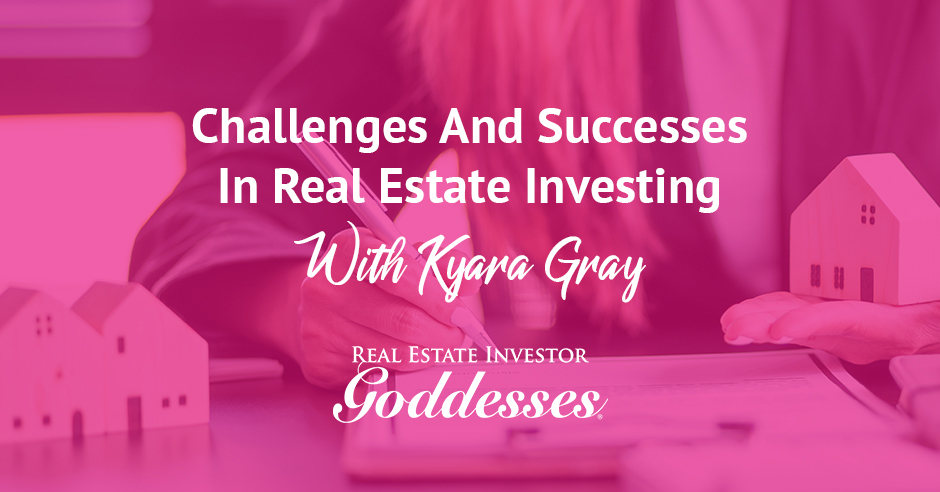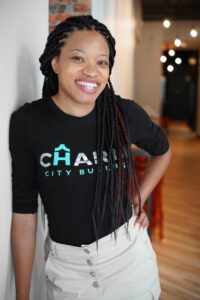
If you’re thinking of investing in real estate, you’re on the right track. It’s an industry that’s profitable and would help you achieve professional goals you’ve always wanted. Monick Halm sits down for a conversation with Kyara Gray on the challenges and success in the real estate investing world. Kyara Gray is the President and co-founder of Charm City Buyers, a multi-seven figure real estate development firm specializing in Baltimore properties. Kyara shares her journey starting from having her first deal and buying a property wrong. She explains how the challenges and mistakes led her to the success she has today. Tune in, learn how to take calculated risks, and scale in your real estate journey!
—
Watch the episode here:
Listen to the podcast here:
Challenges And Successes In Real Estate Investing With Kyara Gray
I’m super excited to have with me Kyara Gray of Charm City Buyers, who is certainly no exception to the rule. She’s a big-time badass. She’s the President and Cofounder of Charm City Buyers, a multi-seven figure real estate business specializing in Baltimore properties. She draws from her decade of experience mastering the art of rehabbing residential buildings. She runs the NEXTGen Accelerator program, which has helped hundreds of mentees across the country find finance and renovate properties in six months or less. Like me, she has the heart to help other people. I feel like she’s a soul sister and I’m happy to have her. Welcome, Kyara.
Thanks for having me.
I’m super thrilled you’re here. How did you get started investing in real estate?
I started investing in real estate about a year out of college. I was super young. I was raised talking about the power of ownership. I was told very young about a story of my ancestors who started their own town called Hinsonville in Pennsylvania, the ground that is known as Lincoln University. With that history, I learned the power of not only ownership and community building but also being able to own that transformation. As a child watching farmland being sold and houses being built planted that seed. I always said, “When I graduate college, I want a dog and I want to start buying houses.” I did both within about a year of graduating from school.
How lucky you were to have that story because that was not the story that I got. It was not a story of ownership. It was a story of, “Go to college, get a good job as a doctor, lawyer, professor, engineer, and then buy a house,” but never real estate investing. It was never, “Let’s think about owning stuff.” You were very blessed to have that.
It was a blessing. I didn’t realize until I got older the power and the influence that story had. It wasn’t told in the way of saying, “You should invest in real estate. You should do these things.” It was like a seed that I didn’t realize was planted until I started to look at what I’ve been reaping over the years. I’m like, “What happened? Why?” It’s like I’m tracing back my own roots.
A lot of us are taught, “You go to college. You get a job.” I was totally on the path of climbing the corporate ladder. I had a great job after graduating from school. I was working at a Fortune 100 company. I was on that path and I could have been a badass working for someone else. That’s where my husband came in and planted his own seeds of thinking about entrepreneurship.
What you’re doing for someone else, you can do for yourself. He brought that entrepreneurship piece into my life that pulled all of those different things together on being able to run a business, do operations, and all of those things, but then do it for myself, for us, for our family and for the future generations. That’s how it all came to be.
A lot of people don’t think about this, but real estate investing is a business. With your husband, you decide to scale it. Tell us a little bit more about that story. How did that come together? On the one hand, you have your own investing, development, and all that part. On the other side, you’re helping others.
As an entrepreneur, you have to decide not to quit. Share on XWe bought that first one a year out of college. At that time period, most people think about their own journey, friends, family or kids. That first year, when everyone goes back to school and you get to go back to work, that is a transition. During that period was when we started to define our goals like what I wanted to do and accomplish, and what he wanted to do and accomplish. We were dating. He was my boyfriend at that time. I was like, “What does this look like if we’re going to do this together?”
That’s when it started to click. Not only do I want to buy a house, but I also want to build options for myself by leveraging real estate. I want to be able to bring in an income where I have the option to work for myself and I don’t need to run, do all of these things for someone else, and be a number like an employee ID for this huge company. That’s when I set the goal to say I wanted to work full-time for myself by the time I was 30.
That goal is what set the foundation to be able to build a portfolio. We started with that first property. We bought it for about $26,000. We put up almost $120,000 into it. It was a big renovation of a three-unit property. We took the revenue from that property as we still had our full-time jobs. We rolled the revenue into the next house. It snowballed into building our portfolio using creative ways of getting access to money, funding, and different opportunities to buy property.
That’s what set that foundation for building a portfolio to create a life and a lifestyle. Although my goal was to leave my full-time job by the time I was 30, I left at 27. I’ve been running my own business, being on my own, and signing my own checks for many years, which has been a great and interesting experience in and of itself.
I want to follow up on something you said, which is about some of the creative ways in which you were financing and funding. A lot of people believe that they’re limited to their own capital credit and what they can get from a bank. What were some of the more creative ways in which you were able to finance properties?
A key piece to why and how we were able to grow the way we did and get to where we are now with our portfolio, the size and revenue was that very first project. Everyone wants to wholesale when they get into real estate. Our original plan was to wholesale that property. We were going to make some quick cash. It was going to be easy because that’s how it’s shared.
What we learned was that although the numbers were amazing and all of those things, the neighborhood had a reputation that people couldn’t wrap their heads around. We decided to double down on what we knew was true, which was it was a great deal. The problem was I did not have a trust fund. My husband did not have a trust fund to do this $120,000 renovation. I’m like, “How are we going to do that? How are we going to make that happen?”
What happened was we connected with a nonprofit whose goal was to develop the same community in which we purchased this property, and they funded the renovation. That first project planted that seed to say, “They print money 24 hours a day, 7 days a week.” We’ve seen they can do that on double-time if they want to.
Money is abundant. It’s about your ability to get access to it, ask the right questions, know and understand how to solve money problems and get you some of that money. In the first deal, we worked with a nonprofit. In the second deal, we seller-financed. In the third deal, we had a private lender. We were creative on how we got access to those funds so that we were able to create win-win situations not only for us but also for our financial partners and the communities in which we were investing.

Real Estate Investing: You can run a business. What you’re doing for someone else, you can do for yourself.
I had an interview with a woman who runs one of these community projects, where they have money to help investors. In that case, it was more on the commercial side. I think about seller financing, private lending, and all of that. There’s money set aside in certain communities to fund this kind of thing, so that’s great. Where are you now? Where are your investments?
We have eight active construction projects going on. We have two more that are starting. We have a few falling off and selling. Things are in and out all of the time as far as construction projects. We still have rental properties. We had over twenty by the time I was 30. We buy and we’re doing things all of the time. We were scheduled to have a closing so we’re still super active on what’s happening in Baltimore. We also have a project that we’ll be formally announcing very soon. We’re about to start an almost 50-unit new construction project in Baltimore City.
We’re quite literally going from buying individual houses to we did a block project where we pretty much adopted a neighborhood and transformed a block in Baltimore to naming, creating and designing our own community. It’s so cool to think about where we started, where we are now and continue to dream about where we’re going. We’re still very much active and talking about what we’re doing every single day.
I have things in different states. It’s great that you’re dialed into one community in Baltimore. What are the benefits of getting to know a community so well like that?
We have one property that’s out-of-state. We focus on Baltimore for a multitude of reasons. One is being that we are 1,000% experts in Baltimore. This is what we do. When we are walking through a property or even thinking of a property in a certain neighborhood, I know how those properties are structured because I understand what they’ve built. I know the characteristics and I know how that works.
When we talk about rental income around me, I know what it is in certain neighborhoods. You become an expert when you’re able to focus like that. Even beyond that, when you think about Baltimore, there are a lot of different pieces that require you to know and understand Baltimore to be successful here. You have the fact that Baltimore is block-to-block. You have the fact that Baltimore has nuances from a historical perspective with redlining and those types of issues that create a lot of the challenges you see. You have Baltimore that has a challenging reputation, be it true or not. That influences how things work here.
You have vacant properties here that have been vacant for 30 to 40 years. They have very specific things you have to know and understand when you’re going through that renovation process. Not only do we know that because we’re experts here, but we’re also able to take the fact that we are experts and equip people who may think, “Baltimore has cheap houses so I’m going to go buy something cheap. Let me go do all the things I see online,” and be able to say, “Here’s how not only to invest in Baltimore but also do it the right way.”
We can invest in a city like Baltimore and completely turn on its head what many other cities like Baltimore have seen as they’ve grown and developed over time, Harlem, Brooklyn, Oakland and DC. We know what it looks like for cities like Baltimore to change and develop by being experts here and sometimes taking what could be a sacrifice.
To focus heavily here gives us an opportunity to make a larger impact in Baltimore. We’re able to write our own chapter in the history of the city, not only from the work that we’re doing ourselves but also in the work that we’re pouring into many other people. They’ve been buying in Baltimore right alongside us to build not only their own wealth and generational wealth for their families, but also help us build Baltimore. We’re big on collaboration over competition.
Define your goals and be clear on what you want to accomplish. Share on XThere’s enough opportunity, property and money out here for everybody. How can we make sure that we’re surrounding ourselves and Baltimore with people who have that mindset of adding value to the community in which they’re investing while also making a few dollars? We’re able to close that wealth gap and be intentional about the financial freedom we’re building for ourselves. Baltimore is it. We’re focused here. We’re building here for today, for tomorrow, for our kids and our kids’ kids. It’s fun and exciting. We’re close, born and raised here. We love Baltimore.
You’re building a community in the same way that your ancestors did. You’re taking on that generational legacy. That’s beautiful. I want to ask you a question. This is my favorite question because I find that we get so much more out of what doesn’t go right than what does. What would you say was your biggest mistake and what did you learn from it?
If you invest in real estate and you can’t even organize your thoughts on mistakes that you’ve made along the way, you’re playing yourself. There are many different things, especially being so young and naive when we started. Even that very first deal, we bought that property wrong. It’s like, “How did you do that?” We were excited and anxious about buying that property. We got it through an auction.
We were a year out of college. We had an option of getting a full warranty deed, which was going to cost us an extra $1,200, or a quitclaim deed. We were like, “We can save that money. Based on this little document on the background of the property, let’s say that’s all $100. We’re going to wholesale the property anyway.”
We purchased the property and before we swung a hammer, we had an $8,000 back-tax bill and a $4,000 backwater bill. There was an extra $12,000 just from not knowing. Our story of starting and growing is riddled with challenges, mistakes, taking on too much risk, or not having the right information. What became the foundation of NEXTGen and our mentorship program is that we’ve made mistakes. We had to figure it out the hard way. We are valedictorians of the School of Hard Knocks.
We all don’t have to go through that process. We all don’t have to make it hard. We all don’t have to learn the hard way. If we’re able to streamline that process and make sure that more people are finding more success without wasting time, money and energy, and the stress of figuring out the hard way, then we can impact, build and find success in Baltimore more, and help to race the clock of the negative impacts of gentrification that happens all the time. There are many contractor stories. There are plenty along the way.
Anyone who’s been in it long enough will make those mistakes like you and my Goddess Training Program. There are mistakes but it’s a lot better to learn from somebody else’s mistakes than have to make them yourself because it can be expensive if you had a $12,000 mistake.
It’s way less expensive, believe me. It’s so much more expensive to make those mistakes on your own.
With the education, you’re going to pay to learn either way. On the front end, it tends to be cheaper and much less painful. On the back end, you’re going to learn but it’s usually a lot more painful and expensive.

Real Estate Investing: Focus, build your portfolio, and have creative ways of getting access to funding and different opportunities to buy property.
I always knew there are no caps to the tuition for the School of Hard Knocks. There’s no cap to it. That bill gets very big very quickly.
What are you most proud of?
I’m proud of how we are very much ingrained in our purpose. Also, being able to walk in our purpose every day and do that not only on how we invest but also plant that seed in many other people on how they’re investing and buying, how they’re thinking about wealth and opportunity for themselves, their family, the city and the communities in which they’re investing. A lot of times, everyone wants to see the glitz and the glam. You want to see the jewelry, the cars, and the houses as a result of investing. The cash and prizes. Everything’s glitz and glam. Being ingrained and steadfast in our purpose throughout it all is what I’m super proud of.
To what do you attribute your success?
It’s the fact that we decided not to quit. In the journey of entrepreneurship, investing in real estate, and the School of Hard Knocks, there are a lot of times where a lot of people would have quit. The only difference between us and everyone else who started around the same time as us or starting real estate, in general, is that we did not quit. We leaned into the challenges. We learn from the losses and we’re able to continue to build and grow to get to the other side that we’re on now. That has been key for us for many years.
What advice do you have for women starting out in this field?
For my women, stand steady in your power. Sometimes in this industry, you’ll have contractors, investors, developers, and a lot of people who make assumptions about who you are based on just looking at you. I have that all the time, especially when I work side-by-side with my husband. It doesn’t happen as much anymore. If they didn’t know us, they would direct everything to him. That doesn’t last very long. For us, it’s standing strong in your power and your ability. You don’t need a husband, a man or whatever to help guide you along the way or make it happen. You can do so on your own. Also, it’s okay to be the only woman in the room and to own that power because we know our stuff. Own that and you’ll be fine.
Speaking of working with your husband, my husband and I are hosting a virtual Real Estate Investor Soulmates Retreat for couples interested in investing in real estate together. I know that you and your husband have had a very successful collaboration. To what do you attribute your success working together as a couple?
Very early on, we sat down, vision board it, communicate it, and talked about it all. What are my fears? What are my goals? What were his fears and goals? We designed the life that we live. What do we want this to look like? How are we going to create this experience that we want individually and mend and mold that together as one? That has been our North Star in business and personally. We’ve been together for many years. That was key for us. Being able to have those conversations about money, marriage, roles, and all of those things.
Walk in your purpose every day. Share on XWhen you do business with your spouse, you’re adding on to the complexity. We have a child, we’re parents, we’re married partners, we’re business partners, and then we have multiple businesses. There’s a lot to talk about and stay aligned with on a day-to-day basis. Being very intentional about having the uncomfortable conversations as much as the great, beautiful, cute, cuddly ones so that we can stay aligned, stay in our purpose, and keep the vibrations high in the household.
When you’re stacking all of those things up together, it’s easy for all to quickly get very complicated and hard very fast. Communication is key. Staying aligned, surrounding yourself with like-minded people, and having that support system. This is why I love the fact that you’re doing that virtual event. It’s important to be able to find other people who understand and know your experience and create that environment. It becomes a support system and another way to stay on track as you’re going on your own journey.
Same here. Having multiple businesses, kids, and all the things, to be able to have a relationship where you work well together and still can stay passionate, in love, have friends, co-parenting, and all the things, it does require communication and intentionality. You have to be able to communicate about challenging things. I also say to disagree agreeably. You can have disagreements and it can be tough but there are ways of communicating where it’s still respectful. Maybe at the end of it, you have a better solution than you would at the beginning. Some people disagree but they go very personal, mean, trying to cut people down, and bring in things from what happened many years ago.
I don’t want to derail the conversation but we can single on this all day long. What’s so funny about it is if that happens, you still have a meeting you have to go to together. You still have to keep going. It’s very important.
It is with any partnership, especially with your significant other. This has been such a great conversation. Before we get into our famed end of show Trinity, which is a brag, a gratitude, and a desire, what do you wish you’d known at the beginning that you now know?
As you’re in the thick of things and getting things done, it’s always great to see that little light like, “Give me a little glimpse of what it’s going to be ten years from now.” We’re in those situations, “Can I have a little peek?” Being able to have a crystal ball would have been nice. It would’ve helped as you ride the waves, and the ups and downs of business, life or whatever. I didn’t have a mentor, a coach or someone I could call or reach out to. I made myself the resource that I never had when we first got started. Had I had that, a lot of things would’ve changed. It sure as heck would have been nice.
Before our Trinity, what is the best way for people to connect with you and find out more about you and what you do?
You can learn more about myself, my husband, and our journey on social media. On YouTube and everywhere, we’re Charm City Buyers. We’re @CharmCityBuyers on Instagram, Facebook, Twitter, and YouTube. We also have this free class about why Baltimore is so important to all of us when it comes to our investing journey and why Baltimore is an amazing place to invest when it comes to getting returns and hitting those goals that you have. If you go to CharmCityBuyers.com, you can register for that free class and learn a little bit more about what we see and what’s happening on the ground here in Baltimore and why it’s the place to invest.
It’s time for our famed end of show Trinity, which is a brag, a gratitude, and a desire. What’s one thing you’re celebrating? What is your brag?

Real Estate Investing: We have to be very intentional about having uncomfortable conversations, so that we can stay aligned in our purpose.
We’ve been paying attention to the number of our NEXTGen Accelerator mentees. We’ve done over $3 million worth of real estate. We did about 38 units and over $3 million in purchases in just three months. We had four people close. It’s always things happening, going and making it happen. It’s awesome to see and experience all of that alongside all of our mentees.
What’s one thing you’re grateful for?
I am grateful for my family and our lives together. We’re in such a beautiful place. We’re grateful for all the work that we’ve put in, and all of those seeds that we planted, that we’re able to enjoy some of the fruits of our labor as we continue to labor on.
Last but not least, what’s one thing you desire?
I desire the continued opportunity to share our story, our learnings, and empower more people to take control over their own financial freedom themselves, and take control over what it looks like for our communities to continue to grow and develop
So shall your desire be or so much better than you can imagine.
Thank you.
Thank you, Kyara. That was amazing. It’s so wonderful to know you. You can connect with her at Charm City Buyers on all the socials and at CharmCityBuyer.com. Connect with me at REIGoddesses.com. There, you can find out about our upcoming Real Estate Investor Soulmates Retreat, our training program, our Investor Club, and all the things. Make sure that you subscribe to the show so that you don’t miss another amazing interview.
Important Links:
- Charm City Buyers
- NEXTGen Accelerator
- Real Estate Investor Soulmates Retreat
- Charm City Buyers – YouTube
- @CharmCityBuyers – Instagram
- Facebook – @CharmCityBuyers
- Twitter – @CharmCityBuyers
About Kyara Gray
 Kyara Gray is president and co-founder of Charm City Buyers, a multi-seven figure real estate development firm specializing in Baltimore properties.
Kyara Gray is president and co-founder of Charm City Buyers, a multi-seven figure real estate development firm specializing in Baltimore properties.
Drawing from her decade of experience mastering the art of rehabilitating residential buildings, she runs the NEXTGen Accelerator program, which has helped hundreds of mentees across the country find, finance and renovate investment properties in six months or less.
Love the show? Subscribe, rate, review, and share!
Join the Real Estate Investor Goddesses Community today:





